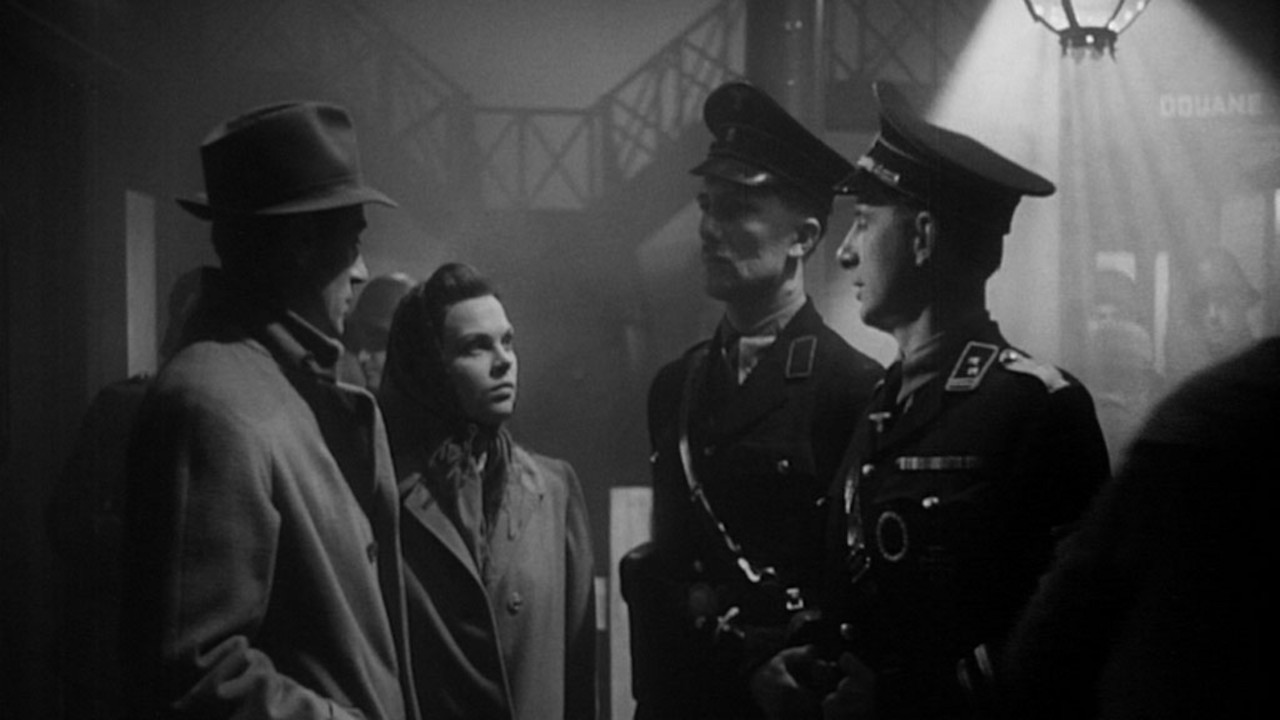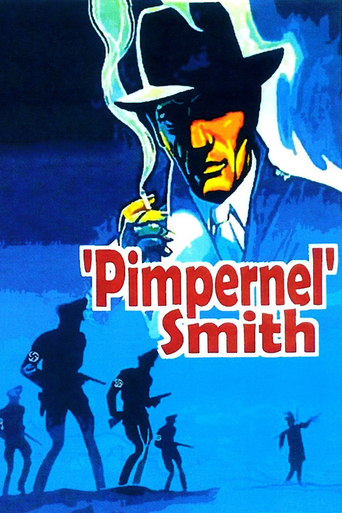


'PIMPERNEL' SMITH is a delightful wartime adventure flick starring Leslie Howard as an updated version of the Scarlet Pimpernel. This time around, he's an archaeology professor who goes to Nazi Germany with a handful of students in order to do some studies. Secretly, he's helping enemies of the Nazis to escape from their oppressors. Howard is excellent in the mild-mannered lead role, delivering a surprisingly humorous performance with lots of character work and one liners. The Nazis are obviously depicted as bumbling idiots, which makes for plenty of funny situations, and the narrative works well with a mix of genre elements.
... View MoreGreat film, highly recommended, a great mixture of comedy, wit , drama and tension rolled into one, not to mention some action as well.A classic that should be seen by everyone.Leslie Howard is fantastic, it keeps you on the edge of your seat, as well as making you chuckle. It's uplifting and has it's turns as well. If you do watch one film this month, make it this one.The acting is superb and the casting first class. Story line may confuse you at first, but after 20 minutes or so, your questions are answered, but this does not ruin the movie at all, in fact is keeps it going, keeping it a mystery,
... View MoreOthers have given plenty of praise. I was disappointed about a few small details, and will mention three instances from that classroom scene and moments after it. First, I found it hard to believe that some of the students (such as David Maxwell) were much less than middle-aged, and indeed Hugh McDermott was 33 (and 3 months) in July 1941. After World War I there were a lot of older men in universities as they had been called up from school; but I don't think this was true in 1939 before the second lot of trouble with Germany started. Second, did young Americans in 1939 really say things like "a rough house is just my meat" when they meant they enjoyed a bit of a fight? I doubt it. It sounded very antiquated, stilted, out of tone with the rest of the dialogue there. (By the way, McDermott was of course British, and his supposedly American accent here is a bit odd at times too.)Third, I recognize that Leslie Howard had an awful lot to do on this movie; but his attention to detail lapsed in the moment when the professor walks through a college cloister and recites a snatch from the first stanza of Jabberwocky: "Twas brillig, and the slithy toves did gyre and gimble ...". In "gyre and gimble" he makes both Gs hard but this is correct only in "gimble". A fastidious learned professor would -- and actor of Howard's stature surely should -- know that "gyre" is a perfectly good English word going back centuries, and that, like "gyrate" and "gyroscope", it begins with a soft G (that is, it sounds like "jyre"). There is no plot reason for Prof. Smith to pretend to get it wrong: as I see it, the point of him reciting the lines is that he is a dreamer, rather other-worldly, and fond of such things as this rhyme from a fantasy for children written by an eccentric mathematics don; not that he is not sufficiently erudite to pronounce such a word as this correctly. Indeed, if he were really chiefly a working secret agent, only pretending to be a Cambridge scholar, he would be more likely to make such a mistake; if it were a deliberate error by the professor, it would be counterproductive. Therefore it is an error by the actor-director, not an error (deliberate or otherwise) by the character.
... View MoreOn the face of it, I don't ask much of a film: only - only! - that it should make me laugh and cry and catch my breath, and stir my blood in equal measure. Strange, then, how rare this seems to be... and how few films earn the final accolade by almost forcing me to review them! I had not the slightest intention, this morning, of writing about "Pimpernel Smith". But now that I sit down afterwards and try to work, I find my attention wandering back to it again and again. Clearly, I must set down this review, or I shall never get anything done... and there can be few stronger tributes to the power of a film.Leslie Howard, of course, makes or breaks the whole. As producer, director and starring actor, his name is scrawled - literally - on the film from its opening titles; indeed it gives us a chance to recognise the penmanship on the mysterious hand-written notes that recur! Unsurprisingly, in some ways this is very much a one-man vehicle. If Leslie Howard's charms escape you, the whole production is probably a dead loss - but for any fan of his earlier films, it is little short of unalloyed delight."Pimpernel Smith" takes much of its resonance from the subtle parallels with Baroness Orczy's story of the Scarlet Pimpernel. The latter is openly referred to only in the title, but acknowledged in a dozen ways, from the leading character who cloaks an incisive mind beneath a foolish mask to the young acolytes who aid and yet rashly put him at risk, the woman who is set to spy out the identity of a beloved one's potential saviour, and of course the closed frontiers and despotic arm of a new-fledged state - not Revolutionary France, but a Nazi Germany not yet at open war. Above all, the echoes lie in the ingenious guises and plans for escape, always one twist ahead of both the enemy and the viewers themselves. By the end of the film, I was suspecting the most innocent characters of being the nondescript Professor Smith in disguise... and I'm still not certain about the indignant lady on the Cook's Tour!The references, however, are never obtrusive and always remain subtle; and of course perhaps the chief of these is the casting of Leslie Howard himself. Along with a humane and intelligent script, it was his outstanding depiction of the title role that raised the 1934 film of "The Scarlet Pimpernel" above the average. Even today, the association is immediate. Less than ten years after the original, the dual performance of their star must have been inescapable.From vacuous fop to absent-minded professor... and yet it is to Howard's credit that his Professor Smith is not a carbon copy of Sir Percy Blakeney, but a distinct and undoubtedly charming character in his own right. For a moment, rapt in admiration of an Aphrodite, he is startlingly handsome. But for the most part, peering owlishly over a newspaper or buried beneath a deplorable hat, he is more the living spit of bespectacled Charles Hawtrey in some post-war "Carry On". He has developed the baggy amble to a fine art, and the knack of deprecation and inoffensive insolence almost without effort; and the role of gentle academic is not a pose, but the guiding principle behind all his unlikely impersonations, even that of the part of hero. The Professor, above all, is a man who hates destruction and waste.Passionate screen kisses rarely move me; oddly enough, a handful of restrained moments of tenderness in this film did. It may be a carefully-scripted star vehicle, but few enough of those choose to celebrate the clever and the unassuming. I like Professor Smith very much indeed.But even the quietest hero needs a villain as foil, and Francis L. Sullivan is also outstanding here as the elephantine von Graum, a Nazi general who turns out to be far less stupid than one might assume. It's hard not to suspect the character of being a lampoon on Goering, and from the start we are invited to laugh at him; but for all his girth and his struggles with "the English sense of humour", von Graum is brighter by far than most of his staff, and sometimes even one step ahead of the viewer, which makes it hard to be complacent on our heroes' behalf. He may rant and foam for lack of proof, but the net is tightening... and without the advantage of Orczy's predetermined plot, the unexpected twist at the end of this film could all too easily go either way. Unfortunately, heroism is not necessarily defined by survival...In fact, in retrospect, I feel that the ending (which I won't reveal here) was perhaps the one weak point. Unlike the Basil Rathbone wartime pictures (there are echoes of "Pimpernel Smith" in the subsequent, not at all bad, "Sherlock Holmes and the Secret Weapon"), the anti-Nazi sentiments of the hero's set-piece speech are not dated or tendentious to modern ears. Indeed, Leslie Howard's shadowed intensity remains one of the most effective shots in the film. The only trouble is that it's so good that it becomes a hard scene to top, and the actual finale comes off as somewhat trite by comparison.But that's with hindsight. At the time, the only thing of which I was fully conscious was that, already pre-disposed in that direction by "The Scarlet Pimpernel" and "Pygmalion", I had just become a raving Leslie Howard fan! Every time I catch myself whistling 'Tavern in the Town' without thinking, over the next few days, I shall know why... and smile.
... View More